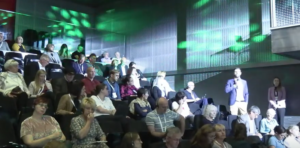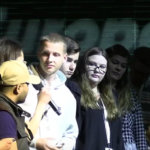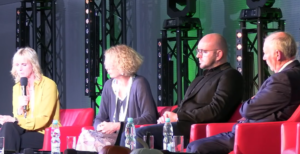 Report, Joint Declaration & Workshop (Does anyone listen?)
Report, Joint Declaration & Workshop (Does anyone listen?)
The fifth meeting of the European Rural Parliament took place in Kielce, Poland, from 12 to 15 September 2022.
The European Rural Parliament is a process aimed to strengthen the voice of rural communities in Europe, to promote self-help, solidarity, exchange and cooperation between rural communities and to enable rural people to play their full role in addressing the challenges currently affecting Europe. Besides long-term dialogue and advocacy at local, regional and national level, the ERP culminates every 2 years in a large-scale transnational meeting.
 The ERP 2022 was attended by around 350 participants from nearly 40 European countries: rural people, representatives of civil society organisations, researchers, entrepreneurs, national governments and European Union institutions. Part of the event focused specifically on young people, within the European Rural Youth Parliament.
The ERP 2022 was attended by around 350 participants from nearly 40 European countries: rural people, representatives of civil society organisations, researchers, entrepreneurs, national governments and European Union institutions. Part of the event focused specifically on young people, within the European Rural Youth Parliament.
 The opening session was attended by EU Agriculture Commissioner Janusz Wojciechowski. The programme included plenaries, panel discussions, study visits to rural projects around Kielce, over 30 thematic workshops, Rural World Café and many other activities, and ended in a joint Declaration signed by representatives of the three pan-European networks involved in the ERP (the European Rural Community Alliance ERCA, the European LEADER Association for Rural Development ELARD, and PREPARE Partnership for Rural Europe), and by a representative of the Polish organisers and partners (the Polish National Rural Network, the Association of the Swietokrzyskie Rural Area Development, and the Polish Rural Forum).
The opening session was attended by EU Agriculture Commissioner Janusz Wojciechowski. The programme included plenaries, panel discussions, study visits to rural projects around Kielce, over 30 thematic workshops, Rural World Café and many other activities, and ended in a joint Declaration signed by representatives of the three pan-European networks involved in the ERP (the European Rural Community Alliance ERCA, the European LEADER Association for Rural Development ELARD, and PREPARE Partnership for Rural Europe), and by a representative of the Polish organisers and partners (the Polish National Rural Network, the Association of the Swietokrzyskie Rural Area Development, and the Polish Rural Forum).
More information: https://erp2022.eu/
Urszula Budzich-Tabor
European Rural Parliament Workshop: Does anyone listen? Intensifying the science, policy and practitioner trialogue and closing research gaps relevant for rural people
Scientists can generate helpful models but often these models sit in academic papers behind paywalls, never being applied in the real world. Practitioners can be frustrated with the goldfish bowl approach of scientists, as scientists watch, observe and analyse but the practitioners may never see the results. Policymakers need good information, well analysed and presented in a readable and understandable format, but where are they getting their information from?
We identified many challenges but the main ones concerned the way research is conducted, the questions that rural people feel are important that are not addressed and the need for indicators to measure outcomes.
It was felt there was an unequal balance of power when it came to researchers obtaining local knowledge for free or using expensive consultation processes, where local inhabitants did not benefit from the results. It was felt that this top-down approach merely duplicated the knowledge that communities already have and thus wasting resources. Researchers should also go to the rural communities and not just expect people to turn up to meetings.
Common questions rural people felt were still unanswered included
- How should responsibility for actions and governance be allocated, for example are people expected to volunteer or should they be paid?
- Why are people working in municipalities closed-minded to change the way they work?
- How can sufficient services be provided to all? Is digitalisation the answer
- Do people who move to the countryside stay/ benefit the countryside?
- What are the main barriers to living in the countryside?
- What kind of institutional arrangements are needed to engage the youth to act instead of just making suggestions and expecting someone else to fulfil them.
- How can we ensure there will be another generation of agricultural producers / farmers?
Indicators for a sustainable community are also needed, but firstly it needs a common language. Indicators are needed to highlight when a community ceases to be sustainable, they need to address the warning signs and what services are needed to ensure continuity. They also need to indicate the contributory factors leading to a community in decline.
We proposed that local communities or associations should have access to funding to engage researchers, through the use of small grants. These grants should not be overly bureaucratic and they should be impact-based not only output based as well as allowing a degree of experimentation. The creation of knowledge hubs to localise knowledge was also proposed. It was suggested that the European Rural Parliament or farming associations could commission research on behalf of rural communities.
Good practices that were identified were research projects undertaken by Belgian farmers associations and the Power Down project (c.2009) managed by Community Energy Scotland using Climate Challenge Funds. This project co-ordinated funding and support for small scale projects across rural Scotland including creating, importantly, headspace for reflection.
Joanna Storie
Leave a Reply
You must be logged in to post a comment.